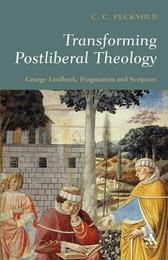
|
Transforming Postliberal Theology: George Lindbeck, Pragmatism and Scripture
Paperback / softback
Main Details
| Title |
Transforming Postliberal Theology: George Lindbeck, Pragmatism and Scripture
|
| Authors and Contributors |
By (author) C.C. Pecknold
|
| Physical Properties |
| Format:Paperback / softback | | Pages:182 | | Dimensions(mm): Height 216,Width 138 |
|
| Category/Genre | Christian theology |
|---|
| ISBN/Barcode |
9780567030344
|
| Classifications | Dewey:230.046 |
|---|
| Audience | | Undergraduate | | Postgraduate, Research & Scholarly | | Professional & Vocational | |
|---|
|
Publishing Details |
| Publisher |
Bloomsbury Publishing PLC
|
| Imprint |
T.& T.Clark Ltd
|
| Publication Date |
1 October 2005 |
| Publication Country |
United Kingdom
|
Description
Transforming Postliberal Theology responds to George Lindbeck's seminal proposal for postliberalism in The Nature of Doctrine: Religion and Theology in a Postliberal Age some twenty years after its first publication. Occasioned by new studies in the theological and religious roots of pragmatic philosophy, Pecknold argues that postliberalism represents 'a new pragmatism' that rediscovers its theological and semiotic roots in Scripture. Testing this hypothesis, Pecknold assesses Lindbeck's book, and; the book's critics read, to ask if there are good, immanent reasons for long-standing criticisms to remain. Pecknold proposes that problems readers have with postliberalism can be resolved through deeper engagements with Lindbeck's pragmatism. Arguing that Augustine stands at the roots of a kind of 'scriptural pragmatism' appropriate to Lindbeck's postliberalism, Pecknold shows that Christian theology has incarnational and trinitarian resources for the 'theo-semiotic' repair of entire traditions of inquiry without capitulating to pragmatic tendencies towards relativism, or postliberal tendencies towards sectarianism. Displaying the theo-semiotic influence of Augustine on Peter Ochs' rabbinic pragmatism and Lindbeck's Christian pragmatism, Pecknold also uncovers significant theo-political implications for the scriptural relationship between the Church and Israel, and through this relationship, rediscovers the necessity of a return to Scripture for ecclesial communities that are prepared to engage in responsible repair of the world. Transforming Postliberal Theology entails a rediscovery and creative development of postliberalism for a new generation of theologians and other thinkers who recognize the centrality of the Bible for the reformation of thought and action in the church and in the world.
Author Biography
Dr. C.C. Pecknold is Assistant Professor, Historical and Systematic Theology, at The Catholic University of America School of Theology and Religious Studies, Washington DC, USA.
Reviews'[A] compelling case for rethinking postliberalism in pragmatic terms.' Daniel Castelo, Seattle Pacific University, International Journal of Systemic Theology -- Daniel Castelo, Seattle Pacific University, International Journal of Systemic Theology, Oct 07 "in this carefully argued book, Pecknold seeks to affirm what he takes as the core of Lindbeck's "postliberal" approach to theology-attentiveness to the way in which signs mediate our experience of reality-while suggesting that many of the criticisms levied against it (e.g., its alleged relativism and sectarianism) can be addressed by a systematic development of Lindbeck's real (if largely implicit) pragmatism, in which doctrines are tested against their ability to sustain the intelligibility of communal practices in novel contexts...On this largely Ochsian reading of postliberalism, scripture is not seen as a closed semiotic grind that "absorbs" the word without remainder, but rather as an open "scaffolding" in terms of which the community is called to test its understanding of God in conversation with Christian and non-Christian others." -Ian A. McFarland, Religious Studies Review, Vol. 33, No. 2, April 2007 -- Ian A. McFarland 'Postliberalism represents the leading edge of Christian theology today. George Lindbeck's is the most influential founding voice in postliberalism. And Chad Pecknold has composed the most important recent work on Lindbeck's postliberalism. Transforming Postliberal Theology makes two powerful philosophic claims: that Lindbeck's postliberalism finds its philosophic ally in Charles Peirce's pragmatism more than in Wittgenstein's theory of language games; and that both Lindbeck and Peirce find their theo-philosophical antecedent in Augustine's semiotics. On the strength of these claims, Pecknold devotes most of the book to redescribing Lindbeck's postliberalism as a species of "scriptural pragmatism," best understood in dialogue with both Christian and Jewish "theo-semiotics," from Augustine to Peirce to more recent rabbinic philosophies. Pecknold's remarkable work should be required reading for all who are influenced by or interested in the postliberal turn.' Peter Ochs, University of Virginia * Blurb from reviewer * 'A fresh and persuasive approach to the controversies generated by "postliberal" theological projects. It suggests a more accurate reading of most "postliberal" proposals than their critics often provide, while taking critics' objections to them with utmost seriousness. In short, it makes an original and important contribution to current theology and deserves a wide hearing.' David H. Kelsey, Weigle Professor of Theology, Yale Divinity School, New Haven, CT, USA * Blurb from reviewer * 'An important and fascinating issue for Christian theology is how postliberalism, which has been such a fruitful movement in the late twentieth century, is to develop in the twenty-first century. Pecknold offers a rich, perceptive discussion of George Lindbeck and the debates surrounding his thought, and then constructively goes beyond Lindbeck in dialogue with CS Peirce, recent Jewish thought, and above all Augustine of Hippo. The result is a strong, convincing proposal for a scriptural pragmatism that can engage deeply with scripture, tradition, the church, other scriptural faiths, and pressing public issues.' David F. Ford, University of Cambridge * Blurb from reviewer * '[A]n accessible yet thought-provoking introduction to current scholarly debates...Fluent and responsible work like this needs to be read and absorbed by as many practitioners as possible.' -- David Grumett, University of Exeter, UK * Theology *
|